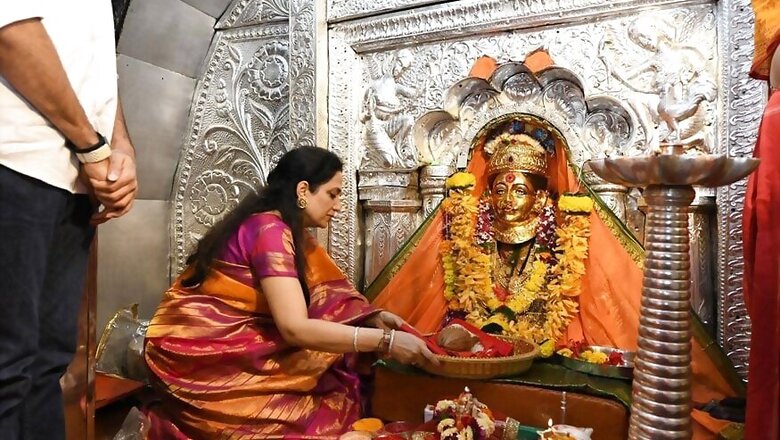Reading the Fine Print on Political Implications of Rashmi Thackeray's Appointment as Saamana Editor

views
Behind every successful man is a woman, goes the cliché.
As Maharashtra chief minister and Shiv Sena president Uddhav Thackeray's better half, Rashmi Thackeray has been credited with much of his political decision-making and successes. However, if straws in the wind are something to go by, Rashmi may now emerge from the shadows to assume a more pro-active role in politics.
On Sunday, the print line of the Shiv Sena mouthpiece Saamana was changed to reflect Rashmi’s name as the editor. Shiv Sena hawk and Rajya Sabha MP Sanjay Raut will continue as the executive editor of the publication. Though Rashmi's post may be seen as a sinecure — it is Raut and his team who handle the daily grind and editorial decision-making — this change is significant.
When Saamana was launched as the Shiv Sena's mouthpiece in 1989, it had party supremo, late Bal Thackeray, as the editor, and Ashok Padbidri, who had a socialist orientation, was the executive editor.
Later, Raut joined from the Indian Express group's Marathi weekly Loksatta as Padbidri's replacement in 1992. Though many of the newspaper's editorials spelling out the Shiv Sena's line were written by Raut, they were attributed to the Sena chief.
After Bal Thackeray's demise in 2012, Uddhav replaced him as the editor, but had to step down from the position after becoming the chief minister of Maharashtra.
Rashmi's appointment as the editor of the newspaper reiterates the Thackeray family's control over it, and may be her soft launch for a more formal role in politics. While Rashmi has been active in the Shiv Sena for decades, she may increase her engagement with the party organisation due to her husband and elder son getting positions in the state government. amed as editor of `Marmik', a Marathi cartoon weekly started by Shiv Sena founder Bal Thackeray in 1960
The appointment also has another angle of intra-party politics. In the long run, Raut, seen as the man of the match in the Shiv Sena's alliance with the Congress and Nationalist Congress Party (NCP), may eventually see his wings clipped in the way in which he controls the deeply influential Saamana.
Born to Meena and Madhav Patankar, the Shiv Sena's first lady spent her formative years at Dombivali in Mumbai's extended suburbs, and graduated from the Vaze-Kelkar College. She joined the Life Insurance Corporation of India (LIC) in 1987. During this time, Rashmi became friends with Jaywanti, Bal Thackeray's niece and Raj Thackeray’s elder sister.
Jaywanti suggested Rashmi as a bride for elder cousin Uddhav, who she called ‘Dadu’. Rashmi and Uddhav were married in December 1988 at the Raja Shivaji School in Dadar.
Uddhav, who was then running an advertising agency, was launched into politics later, though he played a behind-the-scenes role, compared to his flamboyant younger cousin Raj, who was seen as his uncle's political heir.
The Shiv Sena came to power in Maharashtra for the first time in 1995. The period saw a massive churn within the Thackeray clan due to charges against Raj in connection with the death of Matunga resident Ramesh Kini in July 1996. It was alleged that Kini, who was found dead in suspicious circumstances in a cinema hall in Pune, on a day when the road and rail traffic between the two cities was disrupted due to torrential rains, was being threatened to vacate his tenanted house by his landlords, who were close to Raj.
The subsequent controversy saw Raj being sidelined in the Shiv Sena, and Uddhav, whose camp was at odds with that of Raj, emerged as a power centre.
The sudden deaths of Bal Thackeray's wife Meenatai and elder son Bindumadhav, aka Binda, changed the power dynamics in the Thackeray family. Smita, the wife of the Sena patriarch's second and estranged son Jaideo, competed with Uddhav and Rashmi to fill the gap.
This kitchen politics swung Uddhav's way later and he was anointed the Shiv Sena's working president in 2002, cementing his position as the party's number two and his father's heir apparent.
Then leader of opposition and former chief minister Narayan Rane, with whom Uddhav fell out, charged that Bal Thackeray's attempts at reconciliation with him (Rane) were stonewalled when Uddhav threatened to walk out of Matoshree (the Thackeray family residence) with Rashmi. Rane eventually joined the Congress in 2005, and posed one of the strongest existential threats to the Shiv Sena for a while, with his men putting Shiv Sainiks on the back foot in pitched street battles.
After a long and protracted power struggle with Uddhav, Raj also quit the Shiv Sena in 2005 to form his own Maharashtra Navnirman Sena (MNS) the next year.
Despite the obvious crisis for the party and challenge to his leadership, Uddhav and his father managed to keep their flock together.
Shiv Sena insiders say that Rashmi, who has been a constant presence at Uddhav's side in his political journey, worked hard to smoothen ruffled feathers in this period. While preventing a further exodus of leaders and functionaries to the Rane and Raj camps, Rashmi also ensured that some of these dissidents were eventually brought back to the Shiv Sena.
The Achilles’ heel for Uddhav has been described as his poor communication with his men. This is perhaps an extension of his introvert personality. Rashmi emerged as an alternate line of communication for party leaders, who were unable to reach Uddhav through the conventional route. Those who have seen Rashmi at work in these times say she was among those who helped extricate Uddhav and the party from this crisis.
Uddhav has been described as a typical “family man” attached to his wife and sons Aaditya (the incumbent environment minister and Yuva Sena chief) and Tejas. Their relatives say that there are no “negative vibes” in the Thackeray household.
However, though Uddhav has often been called a ‘reluctant politician’ with his political foray being attributed to Rashmi's ambitions, even a cursory look at his career trajectory will reveal that the Maharashtra chief minister is as consummate a politician as anyone else. Uddhav had spoken about his chief ministerial ambitions way back in 1999 and would realise them two decades later.
However, Rashmi is described as politically astute. Shiv Sena insiders who have interacted with Rashmi vahini (sister-in-law) as she is known, say she has sharp political instincts and wants her husband to take the political centre stage. They acknowledge Rashmi as the power behind the throne, but also stress that Uddhav has a mind of his own. She however provides her husband inputs from the ground after due diligence and manages to strike a balance between the old guard and young Turks within the party.
Rashmi's brother Sridhar Patankar is also said to be influential behind the scenes as are the Shringarpures, the family of her maternal uncle.
Varun Sardesai, the civil engineer son of Rashmi's sister Swati, is also the shadow for cousin Aaditya. Varun, who is a core committee member of the Yuva Sena, has often taken up cudgels on behalf of the party and Aaditya on social media, crossing swords with the likes of Amruta Fadnavis, the wife of former chief minister Devendra Fadnavis.
Said to be a good hostess like late mother-in-law Meenatai, Rashmi is also the mentor for the Shiv Sena women’s wing.
Rashmi's appointment as the Saamna editor has another subtext. The Shiv Sena is known as a patriarchal and conservative political formation. Rashmi will be the first woman to edit the paper.
The Shiv Sena has already attempted a course correction by fielding the suave Aaditya to create a new, auxiliary constituency among cosmopolitan voters in a fast-changing Mumbai. It will be interesting to watch the impact of Rashmi's impending formal political foray on its outlook and approach towards women.
(Dhaval Kulkarni is a journalist and author of the book ‘The Cousins Thackeray: Uddhav, Raj and the shadow of their Senas’. Views are personal)














Comments
0 comment